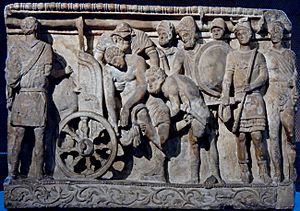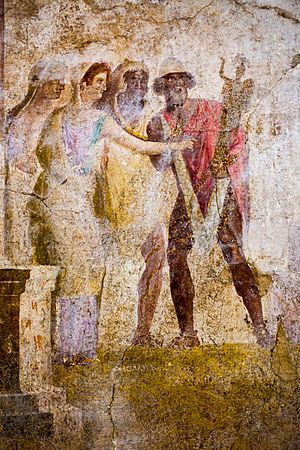Odysseus facts for kids
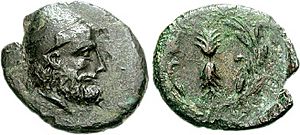
Odysseus was a person in the Greek mythology. He was the king of the island Ithaca, and was married to Penelope. Odysseus and Penelope had a son called Telemachos. Odysseus is a major character in Homer's Iliad and Odyssey. Renowned for his intellectual brilliance, guile, and versatility (polytropos), he is known by the epithet Odysseus the Cunning (Greek: μῆτις, translit. mêtis, lit. "cunning intelligence").
Odysseus fought in the Trojan War, and invented the Trojan Horse, which helped the Greeks win the war. After the war, his adventurous journey home took the time of 10 years. The story of that journey is told in the Odyssey.
The Latin name for Odysseus is Ulysses.
Contents
Mythology
Before the Trojan War
When Helen of Troy is abducted, Menelaus calls upon the other suitors to honour their oaths and help him to retrieve her, an attempt that leads to the Trojan War. Odysseus tries to avoid it by feigning lunacy, as an oracle had prophesied a long-delayed return home for him if he went. He hooks a donkey and an ox to his plow (as they have different stride lengths, hindering the efficiency of the plow) and (some modern sources add) starts sowing his fields with salt. Palamedes, at the behest of Menelaus' brother Agamemnon, seeks to disprove Odysseus' madness and places Telemachus, Odysseus' infant son, in front of the plow. Odysseus veers the plow away from his son, thus exposing his stratagem. Odysseus holds a grudge against Palamedes during the war for dragging him away from his home.
Odysseus and other envoys of Agamemnon travel to Scyros to recruit Achilles because of a prophecy that Troy could not be taken without him. By most accounts, Thetis, Achilles' mother, disguises the youth as a woman to hide him from the recruiters because an oracle had predicted that Achilles would either live a long uneventful life or achieve everlasting glory while dying young. Odysseus cleverly discovers which among the women before him is Achilles when the youth is the only one of them to show interest in examining the weapons hidden among an array of adornment gifts for the daughters of their host. Odysseus arranges further for the sounding of a battle horn, which prompts Achilles to clutch a weapon and show his trained disposition. With his disguise foiled, he is exposed and joins Agamemnon's call to arms among the Hellenes.
During the Trojan War
The Iliad
Odysseus is represented as one of the most influential Greek champions during the Trojan War in Homer's fictional account. Along with Nestor and Idomeneus he is one of the most trusted counsellors and advisors. He always champions the Achaean cause, especially when others question Agamemnon's command, as in one instance when Thersites speaks against him. When Agamemnon, to test the morale of the Achaeans, announces his intentions to depart Troy, Odysseus restores order to the Greek camp. Later on, after many of the heroes leave the battlefield due to injuries (including Odysseus and Agamemnon), Odysseus once again persuades Agamemnon not to withdraw. Along with two other envoys, he is chosen in the failed embassy to try to persuade Achilles to return to combat.
When Hector proposes a single combat duel, Odysseus is one of the Danaans who reluctantly volunteered to battle him. Telamonian Ajax ("The Greater"), however, is the volunteer who eventually fights Hector. Odysseus aids Diomedes during the night operations to kill Rhesus, because it had been foretold that if his horses drank from the Scamander River, Troy could not be taken.
After Patroclus is slain, it is Odysseus who counsels Achilles to let the Achaean men eat and rest rather than follow his rage-driven desire to go back on the offensive—and kill Trojans—immediately. Eventually (and reluctantly), he consents. During the funeral games for Patroclus, Odysseus becomes involved in a wrestling match with Ajax "The Greater" and foot race with Ajax "The Lesser," son of Oileus and Nestor's son Antilochus. He draws the wrestling match, and with the help of the goddess Athena, he wins the race.
Odysseus has traditionally been viewed as Achilles' antithesis in the Iliad: while Achilles' anger is all-consuming and of a self-destructive nature, Odysseus is frequently viewed as a man of the mean, a voice of reason, renowned for his self-restraint and diplomatic skills.
Other stories from the Trojan War
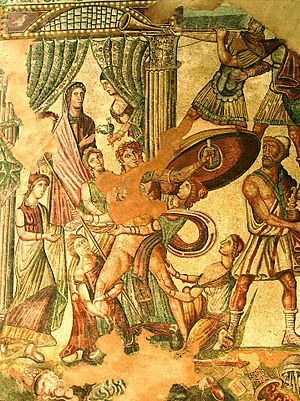
Since a prophecy suggested that the Trojan War would not be won without Achilles, Odysseus and several other Achaean leaders are described in the Achilleid as having gone to Skyros to find him. Odysseus discovered Achilles by offering gifts, adornments and musical instruments as well as weapons, to the king's daughters, and then having his companions imitate the noises of an enemy's attack on the island (most notably, making a blast of a trumpet heard), which prompted Achilles to reveal himself by picking a weapon to fight back, and together they departed for the Trojan War.
The story of the death of Palamedes has many versions. According to some, Odysseus never forgives Palamedes for unmasking his feigned madness and plays a part in his downfall. One tradition says Odysseus convinces a Trojan captive to write a letter pretending to be from Palamedes. A sum of gold is mentioned to have been sent as a reward for Palamedes' treachery. Odysseus then kills the prisoner and hides the gold in Palamedes' tent. He ensures that the letter is found and acquired by Agamemnon, and also gives hints directing the Argives to the gold. This is evidence enough for the Greeks, and they have Palamedes killed.
Together with Diomedes, Odysseus fetches Achilles' son, Pyrrhus, to come to the aid of the Achaeans, because an oracle had stated that Troy could not be taken without him. A great warrior, Pyrrhus is also called Neoptolemus (Greek for "new warrior"). Upon the success of the mission, Odysseus gives Achilles' armour to him.
It is learned that the war can not be won without the poisonous arrows of Heracles, which are owned by the abandoned Philoctetes. Odysseus and Diomedes (or, according to some accounts, Odysseus and Neoptolemus) leave to retrieve them. Upon their arrival, Philoctetes (still suffering from the wound) is seen still to be enraged at the Danaans, especially at Odysseus, for abandoning him. Although his first instinct is to shoot Odysseus, his anger is eventually diffused by Odysseus' persuasive powers and the influence of the gods. Odysseus returns to the Argive camp with Philoctetes and his arrows.
Perhaps Odysseus' most famous contribution to the Greek war effort is devising the strategy of the Trojan Horse, which allows the Greek army to sneak into Troy under cover of darkness. It is built by Epeius and filled with Greek warriors, led by Odysseus. Odysseus and Diomedes steal the Palladium that lay within Troy's walls, for the Greeks were told they could not sack the city without it. Some late Roman sources indicate that Odysseus schemed to kill his partner on the way back, but Diomedes thwarts this attempt.
Journey home to Ithaca
Odysseus is probably best known as the eponymous hero of the Odyssey. This epic describes his travails, which lasted for 10 years, as he tries to return home after the Trojan War and reassert his place as rightful king of Ithaca.
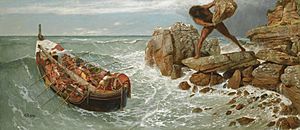
Homebound from Troy, after a raid on Ismarus in the land of the Cicones, he and his twelve ships are driven off course by storms. They visit the lethargic Lotus-Eaters and are captured by the Cyclops Polyphemus while visiting his island. After several of his men die, he and Odysseus have a discussion and Odysseus tells Polyphemus his name is Outis ("Nobody"). Odysseus takes a barrel of wine and the Cyclops drinks it, falling asleep. Odysseus and his men take a wooden stake, ignite it with the remaining wine, and blind him. While they escape, Polyphemus cries in pain, and the other Cyclopes ask him what is wrong. Polyphemus cries, "Nobody has blinded me!" and the other Cyclopes think he has gone mad. Odysseus and his crew escape, but Odysseus rashly reveals his real name, and Polyphemus prays to Poseidon, his father, to take revenge. They stay with Aeolus, the master of the winds, who gives Odysseus a leather bag containing all the winds, except the west wind, a gift that should have ensured a safe return home. However, the sailors foolishly open the bag while Odysseus sleeps, thinking that it contains gold. All of the winds fly out, and the resulting storm drives the ships back the way they had come, just as Ithaca comes into sight.
After pleading in vain with Aeolus to help them again, they re-embark and encounter the Laestrygonians. Odysseus' ship is the only one to escape. He sails on and visits the witch-goddess Circe. She turns half of his men into swine after feeding them cheese and wine. Hermes warns Odysseus about Circe and gives him a herb called moly, which resists Circe's magic. Circe, being attracted to Odysseus' resistance, falls in love with him and releases his men. Odysseus and his crew remain with her on the island for one year, while they feast and drink. Finally, Odysseus' men convince him to leave for Ithaca.
Guided by Circe's instructions, Odysseus and his crew cross the ocean and reach a harbor at the western edge of the world, where Odysseus sacrifices to the dead and summons the spirit of the old prophet Tiresias for advice. Next Odysseus meets the spirit of his own mother, who had died of grief during his long absence. From her, he learns for the first time news of his own household, threatened by the greed of Penelope's suitors. Odysseus also talks to his fallen war comrades and the mortal shade of Heracles.
Odysseus and his men return to Circe's island, and she advises them on the remaining stages of the journey. They skirt the land of the Sirens, pass between the six-headed monster Scylla and the whirlpool Charybdis, where they row directly between the two. However, Scylla drags the boat towards her by grabbing the oars and eats six men.
They land on the island of Thrinacia. There, Odysseus' men ignore the warnings of Tiresias and Circe and hunt down the sacred cattle of the sun god Helios. Helios tells Zeus what happened and demands Odysseus' men be punished or else he will take the sun and shine it in the Underworld. Zeus fulfills Helios' demands by causing a shipwreck during a thunderstorm in which all but Odysseus drown. He washes ashore on the island of Ogygia, where Calypso compels him to remain with her for seven years. He finally escapes when Hermes tells Calypso to release Odysseus.
Odysseus is shipwrecked and befriended by the Phaeacians. After he tells them his story, the Phaeacians, led by King Alcinous, agree to help Odysseus get home. They deliver him at night, while he is fast asleep, to a hidden harbor on Ithaca. He finds his way to the hut of one of his own former slaves, the swineherd Eumaeus, and also meets up with Telemachus returning from Sparta. Athena disguises Odysseus as a wandering beggar to learn how things stand in his household.
When the disguised Odysseus returns after 20 years, he is recognized only by his faithful dog, Argos. Penelope announces in her long interview with the disguised hero that whoever can string Odysseus' rigid bow and shoot an arrow through twelve axe shafts may have her hand. According to Bernard Knox, "For the plot of the Odyssey, of course, her decision is the turning point, the move that makes possible the long-predicted triumph of the returning hero". Odysseus' identity is discovered by the housekeeper, Eurycleia, as she is washing his feet and discovers an old scar Odysseus received during a boar hunt. Odysseus swears her to secrecy, threatening to kill her if she tells anyone.
When the contest of the bow begins, none of the suitors are able to string the bow. After all the suitors have given up, the disguised Odysseus asks to participate. Though the suitors refuse at first, Penelope intervenes and allows the "stranger" (the disguised Odysseus) to participate. Odysseus easily strings his bow and wins the contest. Odysseus has now revealed himself in all his glory (with a little makeover by Athena); yet Penelope cannot believe that her husband has really returned—she fears that it is perhaps some god in disguise, as in the story of Alcmene (mother of Heracles)—and tests him by ordering her servant Euryclea to move the bed in their wedding-chamber. Odysseus protests that this cannot be done since he made the bed himself and knows that one of its legs is a living olive tree. Penelope finally accepts that he truly is her husband, a moment that highlights their homophrosýnē (“like-mindedness”).
Children
According to some late sources, most of them purely genealogical, Odysseus had many other children besides Telemachus. Most such genealogies aimed to link Odysseus with the foundation of many Italic cities. The most famous being:
- with Penelope: Poliporthes (born after Odysseus' return from Troy)
- with Circe: Telegonus, Ardeas, Latinus, also Ausonus and Casiphone. Xenagoras writes that Odysseus with Circe had three sons, Romos (Ancient Greek: Ῥώμος), Anteias (Ancient Greek: Ἀντείας) and Ardeias (Ancient Greek: Ἀρδείας), who built three cities and called them after their own names. The city that Romos founded was Rome.
- with Calypso: Nausithous, Nausinous
- with Callidice: Polypoetes
- with Euippe: Euryalus
- with daughter of Thoas: Leontophonus
See also
 In Spanish: Odiseo para niños
In Spanish: Odiseo para niños


